Belgium emerges on the ice dance scene
Part 2: Livvy Shilling and Léo Baeten
November 6, 2024
By Maria Bagdasarova
Photo © Livvy Shilling & Léo Baeten, Daphne Backman/ice-dance.com, Seán Gillis/Europe On Ice
As Ted Barton and Mark Hanretty aptly said during one of this season's Junior Grand Prix broadcasts, ice dance is a highly demanding sport, camouflaged by shiny costumes and fun music. It's an accurate description. To an outsider, ice dance might look less challenging than the other figure skating disciplines because it lacks jumps, but that's far from true. In fact, because ice dancers don't perform high-impact elements like jumps and might require less recovery time, they often train more, spending additional time on the ice perfecting their steps and deepening their edges.  Off the ice, they are dedicated to refining their choreography and dance moves. In addition to mastering individual technique, skaters must also work on building cohesion as a team, ensuring their movements are perfectly synchronized. This can become an additional challenge when the partners come from completely different skating backgrounds.
Off the ice, they are dedicated to refining their choreography and dance moves. In addition to mastering individual technique, skaters must also work on building cohesion as a team, ensuring their movements are perfectly synchronized. This can become an additional challenge when the partners come from completely different skating backgrounds.
Livvy Shilling and Léo Baeten are representing Belgium on the international senior circuit for the third consecutive season. Despite their different beginnings, they found common ground in a sport that demands both technical precision and creative expression. Here's a closer look at their journey, daily training at the London Campus of the Ice Academy of Montreal (I.AM), and programs for the current season and their interesting perspectives on starting late in figure skating.
This is the second of the two profiles, dedicated to Belgium's emergence on the ice dance scene. The first one on juniors Sofia Beznosikova and Max Leleu can be read here.
A tale of two skaters: Léo's unconventional start and Livvy's road from singles to ice dance
Léo Baeten's journey into ice dance is far from the traditional path many skaters take. Hailing from one of the suburbs of the Belgian capital Brussels, Léo didn't step onto the ice until he was 15. His introduction to the sport happened by chance at a small Christmas market rink where he found himself struggling to skate. "I couldn't skate. I couldn't stop. It was really bad," he recalls his first steps on the ice. But instead of being discouraged by the challenge, Léo was intrigued. The difficulty and the complexity of skating grabbed his attention in a way that no other sport had before.
 Léo had tried various sports growing up, from football to combat sports, but nothing managed to hold his interest for long. "I would pick things up very easily, and after a year or two, I had enough. I just wanted to move on to something else." Skating, however, was different. It wasn't just one skill to master, it was many. "Forward, backward, jumping, spinning - there was so much to explore, and that was really new to me," Léo says.
Léo had tried various sports growing up, from football to combat sports, but nothing managed to hold his interest for long. "I would pick things up very easily, and after a year or two, I had enough. I just wanted to move on to something else." Skating, however, was different. It wasn't just one skill to master, it was many. "Forward, backward, jumping, spinning - there was so much to explore, and that was really new to me," Léo says.
After having completed a learn-to-skate program in Belgium, Léo kept on skating only once or twice a week, often without a coach. By the time he turned 18, he was told by Max Leleu's mother Katerina about the ice dance school of Muriel Zazoui and Olivier Schoenfelder in France. This led to his first major step into the competitive world when he moved to Lyon to pursue ice dance and train at a reputable ice dance school.
His journey wasn't linear. Léo moved across continents, training in France, Russia, and the United States, all while navigating several partnerships. Eventually, through a recommendation from his then coach Fabian Bourzat, Léo was connected to the group of Igor Spilband in Novi, Michigan where he met Livvy Shilling.
Livvy's journey into figure skating began at almost eight years old, when her mother enrolled her in skating classes as a more convenient alternative to ballet. What started as a logistical decision quickly turned into a passion, and Livvy soon dedicated herself to the sport. After years of training as a singles skater in Columbus, Ohio, she moved to Colorado Springs to train at the Olympic training site. She took part in the US Figure Skating Championships in 2017 and represented Team USA at the 2017 Autumn Classic International, an ISU Challenger Series event. However, health issues led her to step away from singles skating, and she soon discovered ice dance with the help of Ben Agosto who then connected Livvy with coach Igor Shpilband.
Forming a partnership
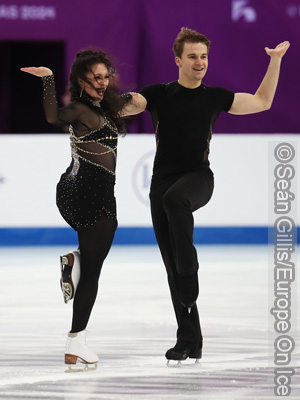 Livvy Shilling and Léo Baeten's partnership didn't click at first during their initial tryout in April 2022. Léo reflects on this, saying, "Livi had much more experience than I did in skating. She was a much better skater. So I thought I needed more practice." After skating with different partners for a few months, they found themselves without partners and, at one of the morning training sessions, Livvy suggested they practice together. By October 2022, they officially teamed up and started representing Belgium on the international stage.
Livvy Shilling and Léo Baeten's partnership didn't click at first during their initial tryout in April 2022. Léo reflects on this, saying, "Livi had much more experience than I did in skating. She was a much better skater. So I thought I needed more practice." After skating with different partners for a few months, they found themselves without partners and, at one of the morning training sessions, Livvy suggested they practice together. By October 2022, they officially teamed up and started representing Belgium on the international stage.
A few months into their partnership, the duo competed internationally for the first time at the Bavarian Open in January 2023, quickly followed by the Egna Dance Trophy, where they achieved the technical minimum scores required to be eligible to compete at World Championships. Léo recalled the rapid progression, noting, "When we started skating together, one of the things I said was that I wanted to go to Worlds," a goal that Livvy initially thought was ambitious. They then faced the excitement of competing at the 2023 World Championships in Japan, a significant milestone for both. Léo expresses gratitude for Livvy's support throughout what she describes as a 'whirlwind experience', especially given his limited prior competition experience in ice dance: "[Before that season] I had done one competition in ice dance, and that didn't really go very well. I had no idea how the next one was going to go. I was very lucky that Livvy helped me a lot through all of this and was very patient."
Training with purpose
Livvy Shilling and Léo Baeten's 2023/2024 season marked a shift. "Last season felt very different than our little half-season that we did before. There we had no expectations at first; we just trained every day and did everything together. But last season, it felt like a whole new ball game," Livvy explains.
Unlike their first season, where Livvy learned programs Léo had skated with his previous partner, last season they had to start from scratch. They also faced injuries that prevented them from performing and training at their best. "We battled some injuries. They were not major; we were still on the ice, but never quite in peak condition. There was a lot of learning that occurred last year. The struggles we had inspired us to make a change," Livvy shares.
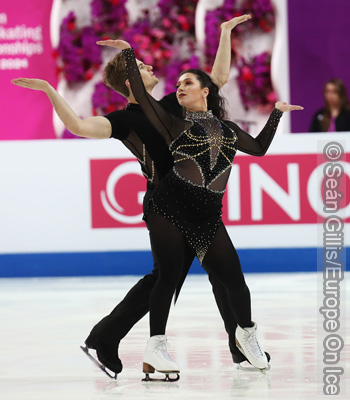 For Léo, the season was marked by the realization that their training route wasn't working. "Last year we were on a path where we tried really hard, but it ended up not being the right way to go for us. We had this idea of doing more of everything we were doing, but it wasn't working," he reflects. This understanding prompted the duo to reevaluate their methods and ultimately make the decision to switch coaching teams, moving from Novi to the Ice Academy of Montreal in London, Canada to train under a coaching team headed by three-time Olympic Champion Scott Moir.
For Léo, the season was marked by the realization that their training route wasn't working. "Last year we were on a path where we tried really hard, but it ended up not being the right way to go for us. We had this idea of doing more of everything we were doing, but it wasn't working," he reflects. This understanding prompted the duo to reevaluate their methods and ultimately make the decision to switch coaching teams, moving from Novi to the Ice Academy of Montreal in London, Canada to train under a coaching team headed by three-time Olympic Champion Scott Moir.
Livvy described the change as revitalizing. "I love it here," she says. "I feel like I'm thriving. I love the coaching, their understanding of skating, technique, and the sport itself, but also the way they understand the athletes and their psychology. It's a very nurturing environment. They also have high expectations for athletes, both in performance and behavior. Everything is well organized. At first, it didn't feel like much of an adjustment, but as we got deeper into the work and programs, the adjustment felt bigger. Still, it was one I was eager to take on. It's really improved how we communicate on the ice and how we approach practice and competition." She also emphasized how the move reignited her passion for training. "It's been a long time since I've come into the rink every day looking forward to training."
For Léo, the adjustment was more complex. "I knew I wanted to change quite a bit in how I approached skating, my partnership and my relationship with the coaches," he explains. "The coaches in I.AM helped me figure out what I wanted and even some things I didn't necessarily want but knew I needed." Despite the challenges, Léo fully embraces the new environment, adding, "I'm really happy with our coaches. It's been nice to know them as people too. It was a good decision [to move here]."
Creating programs that inspire
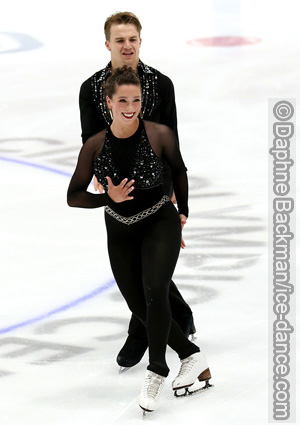 For the 2024 season, Leo and Livvy's programs are designed not just to showcase their technical abilities but to connect with their artistic sensibilities. Their rhythm dance is inspired by the 1960s funk era, featuring the iconic music of James Brown. "We loved the way James Brown sounded, so we stayed with 'I Got You (I Feel Good)' for our first piece," Livvy explains. Their second piece, "Super Bat," was discovered by their coach Madison Hubbell, although Livvy was initially uncertain about it. "To be honest, I wasn't sure we'd stick to it," she admitted, yet it ultimately became her favorite part of the program. They also incorporated a remix of "I Feel Good".
For the 2024 season, Leo and Livvy's programs are designed not just to showcase their technical abilities but to connect with their artistic sensibilities. Their rhythm dance is inspired by the 1960s funk era, featuring the iconic music of James Brown. "We loved the way James Brown sounded, so we stayed with 'I Got You (I Feel Good)' for our first piece," Livvy explains. Their second piece, "Super Bat," was discovered by their coach Madison Hubbell, although Livvy was initially uncertain about it. "To be honest, I wasn't sure we'd stick to it," she admitted, yet it ultimately became her favorite part of the program. They also incorporated a remix of "I Feel Good".
The theme set by the International Skating Union for this season's rhythm dance is social dances and styles of the 1950s, 1960s, and 1970s. "I heard that many teams this year were excited to skate to disco, but together with our coaches we decided against it to avoid being too common. While we still chose a popular piece by James Brown, it's something that we really love. I personally love funky and bluesy music," Livvy explains.
"I wanted to make sure we found something that allowed us to focus on the dancing aspect, a piece that would feel more natural for us. This way, we could rely on our dancing while continuing to improve our technique, rather than struggling to connect to a song and feel limited in our performance," Léo adds.
Their free dance, on the other hand, is a more emotional and personal journey. They chose "It's all Coming Back to Me Now" by Celine Dion, a decision rooted in sentimentality for Livvy. "Celine Dion was the first singer I ever saw at a concert, for my grandma's birthday," she shared. The choice felt serendipitous as the team first connected with the music while they were in Italy (due to visa issues), preparing for Worlds in Japan in the group of Matteo Zanni, where a spontaneous music listening session at their airbnb sparked a thought of creating a program to this piece one day. "We just started dancing and thought, this would be fun to have a program to," Léo reminisces. "It was a full-circle moment when we chose this music, and it's inspiring for us to skate to every day," Livvy adds.
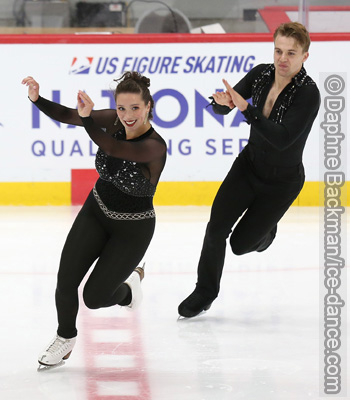 Léo reiterated that their primary goal for this season was to improve as skaters, expressing a desire to uncover new layers of their artistry through these programs: "My main goal was to find something that would help me improve as a skater. I wanted to become a better performer and technician, and I believe these programs will really help me do that."
Léo reiterated that their primary goal for this season was to improve as skaters, expressing a desire to uncover new layers of their artistry through these programs: "My main goal was to find something that would help me improve as a skater. I wanted to become a better performer and technician, and I believe these programs will really help me do that."
Adrian Diaz and Madison Hubbell spearheaded the choreography for the team's rhythm dance. For the free dance, Cara Moir played the leading role, not only overseeing the choreography but also helping refine the quality and execution of the program. Scott Moir's contribution is centered on elevating the overall quality, be it in transitions or crossovers, or improving technical precision in critical moments of the programs. Additionally, guest coaches and choreographers such as Sam Chouinard and Sarah Steben provided valuable input to enhance various aspects of their programs.
Learning from the best
Training in a vibrant environment at I.AM London Campus, Léo and Livvy have the opportunity to skate alongside some of the sport's top athletes. "Christina Carreira and Anthony Ponomarenko are spectacular role models," Livvy says, "not just for their skating but for the energy and professionalism they bring to the camp. It's something we all try to embody." Léo adds that watching his fellow skaters has been eye-opening: "There's such a calmness in their approach, something I wasn't used to. It's a great atmosphere to be part of. And all of the teams I observe have qualities that I want to learn from."
Both skaters also look up to the legends of the sport for inspiration. Livvy is a fan of Tessa Virtue and Scott Moir, while Léo has always admired the French school of ice dance, highlighting past and present teams like Isabelle Delobel/Olivier Schoenfelder, 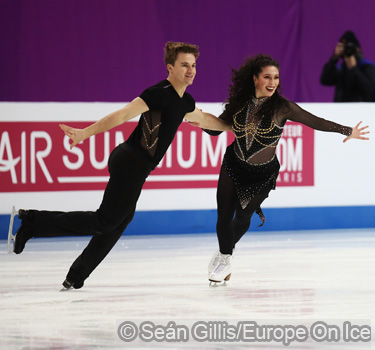 Evgenia Lopareva/Geoffrey Brissaud and Olympic Champions Gabriella Papadakis and Guillaume Cizeron. "There's a softness in how they skate," Leo says. "It's something I've always appreciated."
Evgenia Lopareva/Geoffrey Brissaud and Olympic Champions Gabriella Papadakis and Guillaume Cizeron. "There's a softness in how they skate," Leo says. "It's something I've always appreciated."
The team also draws inspiration from their coaches who were competitive skaters up until recently. Livvy shares, "I was always a big fan of Madison Hubbell. I thought she had the best edge work among female ice dancers and a strong command. If I could have a fraction of that when I leave this sport, I would feel that I achieved something beyond just results." Leo adds, "When you watch Scott [Moir] do some choreography, it leaves me in awe. Our coaches would still kick all our butts."
Carrying the flag of Belgium
For Livvy and Léo, representing Belgium on the international ice dance stage is a deeply meaningful endeavor. "One thing that stood out when we first talked was Léo's passion about representing his country and giving a face of the discipline of ice dance in Belgium," Livvy reminisces. She adds, "As someone who grew up in the United States, my dream as a young child was to represent my country. I completely related to that. It was exciting to think that I would have the opportunity to help somebody else do that for their country." She admires the opportunity to help raise the profile of the sport, particularly in a country where resources and infrastructure are limited. "It's an honor to represent Belgium, not only as a skater but as a team. When we went to Worlds, we were the first Belgian ice dance team in 26 years to compete there, and that's meaningful. Because when we are done, Sonya [Sofia Beznosikova] and Max [Leleu] will continue to hold the flame and burn it brighter. You only need a few people to inspire change," Livvy shares.
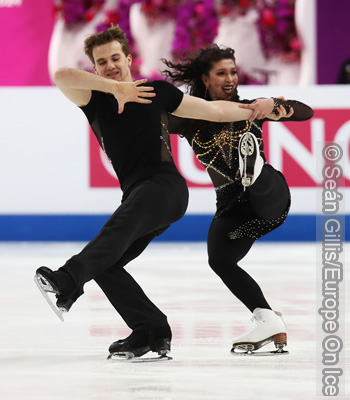 Léo echoes this sentiment: "We're so grateful to the Royal Belgian Figure Skating Federation for their support and the opportunities to represent Belgium in international competitions." He also notes the emotional connection to his home country, mentioning his family bases in Hoeilaart and Wallonia and how they serves as a reminder of his heritage. "Spending most of my year in North America, I miss a lot about Belgium. It's where I grew up, where my parents and my sisters are. There's a calmness I miss, too, because it's such a small country," Léo admits.
Léo echoes this sentiment: "We're so grateful to the Royal Belgian Figure Skating Federation for their support and the opportunities to represent Belgium in international competitions." He also notes the emotional connection to his home country, mentioning his family bases in Hoeilaart and Wallonia and how they serves as a reminder of his heritage. "Spending most of my year in North America, I miss a lot about Belgium. It's where I grew up, where my parents and my sisters are. There's a calmness I miss, too, because it's such a small country," Léo admits.
Embracing the journey: overcoming self-doubt and finding strength
Léo reflects on his journey in ice dance, emphasizing that belief in oneself is always a work in progress. "I remember a distinct moment where my mom asked me if I thought I could ever compete at an international competition, and I told her no," he recalls. He acknowledges that, at the time, it felt impossible given his late start and the limited resources in Belgium. However, travelling to other countries and meeting experts in the field has expanded his perspective. "It's really been a process to understand how much someone is capable of," he explains. Léo appreciates the normalcy of his childhood, which allowed him the freedom to explore various interests without the pressures of the strict routine of an athlete. This openness has fostered a mindset that welcomes possibility and growth.
Livvy praises Léo's unique perspective, noting that his late start in skating has become one of his greatest strengths. While she has years of competitive experience, Léo's fresh outlook allows him to challenge conventional beliefs. "When we started skating together, he was the one saying, 'We're going to Worlds this year,' while I was hesitant," she shares. His willingness to push boundaries inspires Livvy, particularly during training when he encourages her to attempt new things. Léo attributes much of his understanding of skating to his late entry into the sport, saying, "I always had to find a reason and an explanation for myself," which cultivated a deep curiosity about technique and performance. This curiosity not only drives his development but also serves as a source of motivation for his partner.




